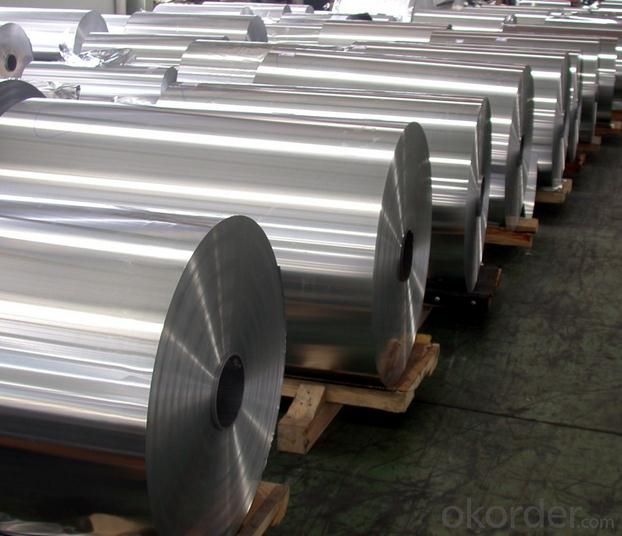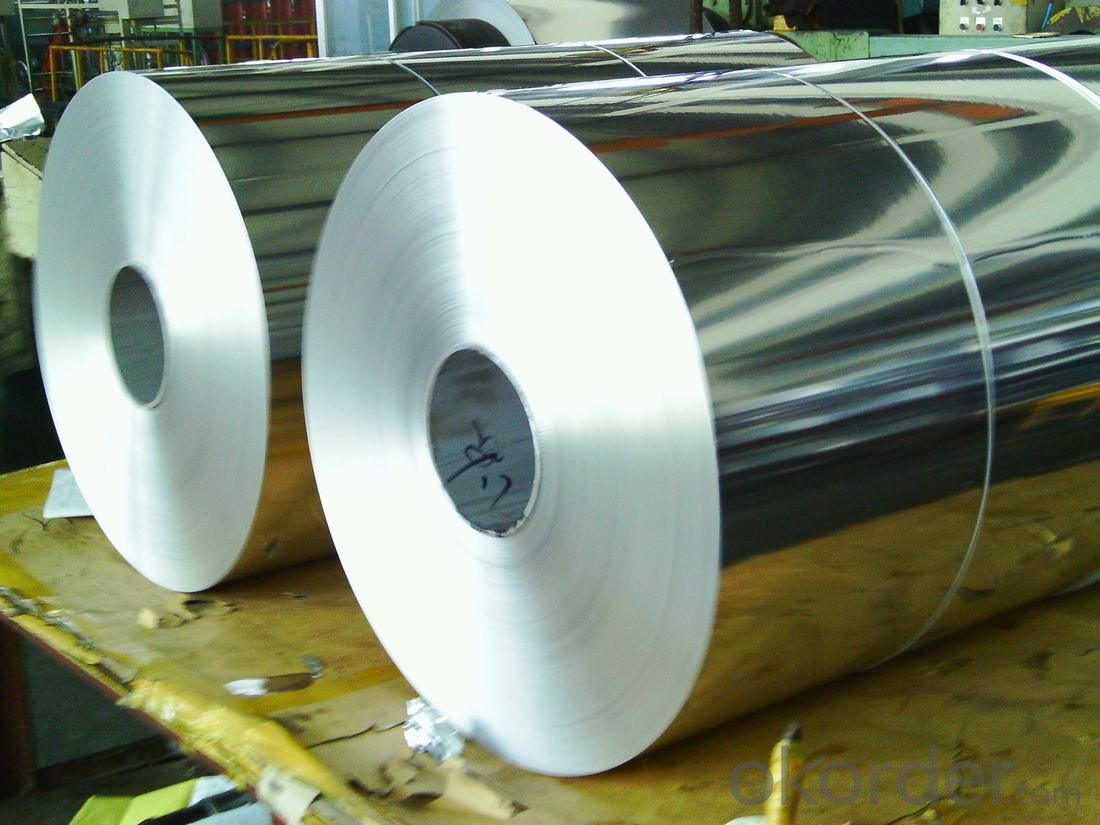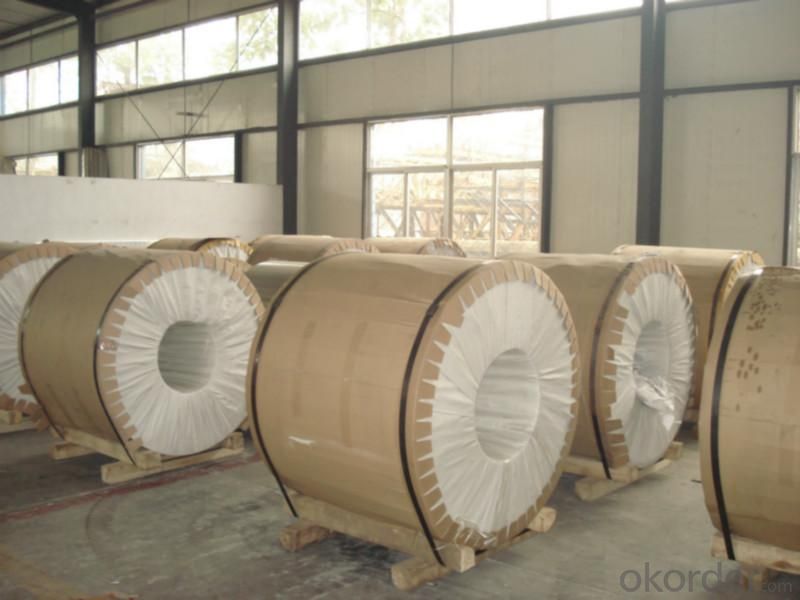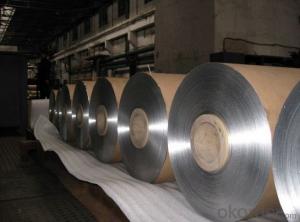ASTM Grade 5005 Aluminum Strips Belt For Solar
- Loading Port:
- Shanghai
- Payment Terms:
- TT OR LC
- Min Order Qty:
- 5 m.t.
- Supply Capability:
- 500 m.t./month
OKorder Service Pledge
OKorder Financial Service
You Might Also Like
Item specifice
ASTM Grade 5005 Aluminum Strips Belt For Solar
aluminum coil specifications:
1) Alloy :1050, 1060,1100, 3003 3004 3105 3A21 5005 5052 etc
2) Temper: O/H12/H14/H1/H18/H32/H34/H36/H38//H111/H112/H116/H321/T6/T651/T3/T351 etc
3) Thickness: 0.1mm to 6mm
4) Width:20mm to 3300mm
5)Coil weight: 100kgs to 6 tons depends on actual requirement
6)Core material: Aluminum or paper
7)Coil Inner diameter: 75mm, 150mm, 200mm, 300mm, 405mm, 505mm or as required
8) Protective film can be added
item | 3003 Aluminum coil | |
Standard | GB/T3190-2008,GB/T3880-2006,ASTM B209,JIS H4000-2006,etc | |
Material | 1060,1050,1100 3003,3103,3004,3005,3105 5052, 5454,5754 | |
Size | Thickness | 0.5mm-3.5mm |
Width | 800-1500mm | |
Weight/Roll | About 1.5MT/3MT | |
Quality control | Mill Test Certificate is supplied with shipment, Third Part Inspection is acceptable. | |
Surface | Bright, polished, hair line, brush, checkered, embossed, etc | |
Trade terms | Price term | ,FOB, CNF, CIF, etc |
Payment Term | TT,L/C | |
MOQ | 2MT | |
20 GP Capacity | About 20-25MT | |
Delivery time | 1.The products will delivery immediately after receiving the payment. 2.According to the order quantity, prompt delivery. | |
Export to | Ireland,Singapore,Indonesia,Ukraine,Spain,Canada,USA,Brazil,Thailand,Korea,Iran,India,Egypt,Kuwait, Oman,Viet Nam, South Africa, Dubai, Russia, etc | |
Package | Stick blue film→plastic film→waterproof paper→1~2 tons on a export standard pallet(corner protection) | |
Application | 1)Further making utensil.2)Solar reflective film3)The appearance of the building4)Interior decorating:ceilings,walls,etc.5)Furniture cabinets6)Elevator decoraction7)Signs,nameplate,bags making.8)Decoration inside and outside the car9)Household appliances:refrigerators,microwave ovens,audio equipment,etc.10)The consumer electronics:mobile phones,digital cameras,MP3,etc. | |



- Q:What is the thickness range of aluminum coils?
- The thickness range of aluminum coils can vary depending on the specific application and industry. However, typically, the thickness range for aluminum coils is between 0.006 to 0.25 inches (0.15 to 6.35 mm). This range allows for a wide variety of uses, from thin and lightweight applications such as packaging materials or electrical components, to thicker coils used in construction or automotive industries. It's important to note that these are general ranges and the specific thickness requirements may vary based on the intended use and customer specifications.
- Q:Can aluminum coils be used in the production of military equipment?
- Yes, aluminum coils can be used in the production of military equipment. Aluminum is a lightweight and corrosion-resistant material, making it suitable for various military applications, such as aircraft components, armored vehicles, and weapon systems. Its strength to weight ratio and ability to withstand harsh environments make it an ideal choice for military equipment manufacturing.
- Q:What is the reason for the grooves that go around the circumference of a tin/aluminium can? It can't be for grip because they're covered with paper anyway and i don't think it would make much difference.
- If they didn't, they would easily be crushed during shipment. It makes them much stronger to have the grooves. Norrie's got a good point.
- Q:Can aluminum coils be used in low-friction applications?
- Low-friction applications can indeed make use of aluminum coils. Aluminum, being a lightweight and corrosion-resistant material, exhibits excellent thermal conductivity. These characteristics render it suitable for a variety of applications that prioritize low-friction. The automotive, aerospace, and HVAC industries often employ aluminum coils in heat exchangers, evaporators, condensers, and cooling coils. These coils are specifically designed to efficiently transfer heat while minimizing friction and energy loss. Furthermore, aluminum coils find utility in electrical motors, generators, and transformers, where smooth operation and reduced energy consumption are vital. Additionally, the lightweight nature of aluminum contributes to overall system weight reduction, thereby increasing efficiency. Moreover, various types of machinery and equipment that necessitate low friction, such as conveyor systems, sliding mechanisms, and bearings, can benefit from the utilization of aluminum coils. Aluminum's low coefficient of friction enables smooth and efficient movement, minimizing wear and tear on components. In conclusion, aluminum coils offer versatility in low-friction applications due to their lightweight, corrosion-resistant, and thermally conductive properties. Incorporating these coils can result in improved energy efficiency, reduced maintenance costs, and enhanced performance across a wide range of industries.
- Q:Can aluminum coils be used in cryogenic applications?
- Indeed, cryogenic applications can utilize aluminum coils. Highly regarded for its remarkable thermal conductivity, aluminum proves to be an appropriate substance for heat transfer in environments with low temperatures. Moreover, aluminum exhibits a minimal coefficient of thermal expansion, enabling it to endure the drastic temperature fluctuations inherent in cryogenic applications while avoiding notable alterations in dimensions. Nevertheless, it is important to acknowledge that aluminum coils might necessitate specific design or treatment to guarantee their resilience against exceedingly frigid temperatures and mitigate any potential concerns like brittleness or embrittlement.
- Q:Can aluminum coils be used for nameplates and labels?
- Yes, aluminum coils can be used for nameplates and labels. Aluminum is a versatile and durable material that can be easily shaped, engraved, or printed on. It is commonly used for manufacturing nameplates and labels due to its resistance to corrosion, lightweight nature, and ability to withstand harsh environments.
- Q:What are the different tempers of aluminum coils?
- Different levels of hardness and strength can be achieved through various heat treatments for aluminum coils, resulting in different tempers. These tempers alter the physical and mechanical properties of the coils to suit specific applications. Aluminum coils can undergo different tempering processes to modify their properties. The most common tempers for aluminum coils are as follows: 1. O Temper (Soft): This represents the annealed state of aluminum, where the metal is fully soft and easily moldable. It has low strength but excellent ductility, making it suitable for applications that require extensive shaping or bending. 2. H14 Temper (Half Hard): This offers moderate strength and hardness, while still maintaining some formability. It is used in applications that require a balance between strength and flexibility, such as roofing or cladding. 3. H18 Temper (Hard): This provides high strength and hardness, with reduced formability. It is commonly used in applications that demand structural integrity and resistance to deformation, such as automotive parts or industrial equipment. 4. H22, H24, H26 Temper (Extra Hard): These tempers are achieved through additional cold working or strain hardening processes. They offer even higher strength and hardness but sacrifice some ductility. They are often used in applications that require enhanced mechanical properties, such as aerospace components or high-stress structural parts. 5. T Temper (Tension Leveled): This involves stretching the aluminum coil beyond its elastic limit and then stabilizing it. It helps eliminate internal stresses and improve flatness, making it suitable for applications that demand precise dimensional stability, such as electronic devices or architectural panels. It's important to note that there are many other tempers available for aluminum coils, each designed to meet specific requirements. The choice of temper depends on factors such as the intended application, desired mechanical properties, and processing capabilities.
- Q:I recently had to have a course of B-12 injections (my digestive system was not properly absorbing other forms). While I felt a significant improvement in mood, energy and memory, I was very concerned to discover that the B-12 shot came with a little something extra: aluminum! I'm wondering if the benefits outweigh the potential risks - why is aluminum placed in the injection? (Are there metal free versions out there?)
- Dietary okorder
- Q:Can aluminum coils be used in the production of aluminum sandwich panels?
- Yes, aluminum coils can be used in the production of aluminum sandwich panels. Aluminum coils are typically used as the outer skins or facings of the sandwich panels. These coils are first processed and coated to enhance their durability, corrosion resistance, and aesthetic appeal. They are then bonded with a core material, such as polyethylene or mineral wool, to create a lightweight and rigid sandwich panel structure. The aluminum coils provide the panels with excellent mechanical properties, such as high strength-to-weight ratio, good flexibility, and thermal conductivity. Additionally, the use of aluminum coils in the production of sandwich panels allows for easy customization, as they can be formed, shaped, and painted according to the desired design and specifications.
- Q:What are the different coil leveling options available for aluminum coils?
- There are several different coil leveling options available for aluminum coils, depending on the specific requirements of the application. 1. Roller Leveling: This is a common method used to flatten aluminum coils. It involves passing the coil through a series of rollers that apply pressure to the material, gradually reducing its thickness and leveling out any imperfections. Roller leveling is efficient for achieving flatness and can handle a wide range of coil sizes and thicknesses. 2. Stretch Leveling: This process involves stretching the aluminum coil in a controlled manner to remove any residual stress and improve its flatness. The coil is passed through a series of powered rollers that stretch and elongate the material, resulting in a more level and stable product. Stretch leveling is particularly effective for thicker and wider coils. 3. Tension Leveling: This method uses tension to remove any waviness or unevenness in the aluminum coil. The coil is passed through a series of bridle rolls that apply tension to the material, effectively flattening it out. Tension leveling is commonly used for thinner gauges of aluminum and can handle high-speed processing. 4. Precision Leveling: This is a specialized leveling process that is often used for high-precision applications where extremely flat and uniform coils are required. Precision leveling involves using a combination of roller leveling, stretching, and tensioning techniques to achieve the desired flatness and eliminate any imperfections in the material. This method is commonly used in industries such as aerospace, automotive, and electronics. Overall, the choice of coil leveling option for aluminum coils depends on factors such as the desired flatness, coil thickness, width, and the specific requirements of the application. Each method has its own advantages and limitations, and it is important to select the most appropriate option to ensure the highest quality end product.
1. Manufacturer Overview |
|
|---|---|
| Location | |
| Year Established | |
| Annual Output Value | |
| Main Markets | |
| Company Certifications | |
2. Manufacturer Certificates |
|
|---|---|
| a) Certification Name | |
| Range | |
| Reference | |
| Validity Period | |
3. Manufacturer Capability |
|
|---|---|
| a)Trade Capacity | |
| Nearest Port | |
| Export Percentage | |
| No.of Employees in Trade Department | |
| Language Spoken: | |
| b)Factory Information | |
| Factory Size: | |
| No. of Production Lines | |
| Contract Manufacturing | |
| Product Price Range | |
Send your message to us
ASTM Grade 5005 Aluminum Strips Belt For Solar
- Loading Port:
- Shanghai
- Payment Terms:
- TT OR LC
- Min Order Qty:
- 5 m.t.
- Supply Capability:
- 500 m.t./month
OKorder Service Pledge
OKorder Financial Service
Similar products
New products
Hot products
Related keywords





























